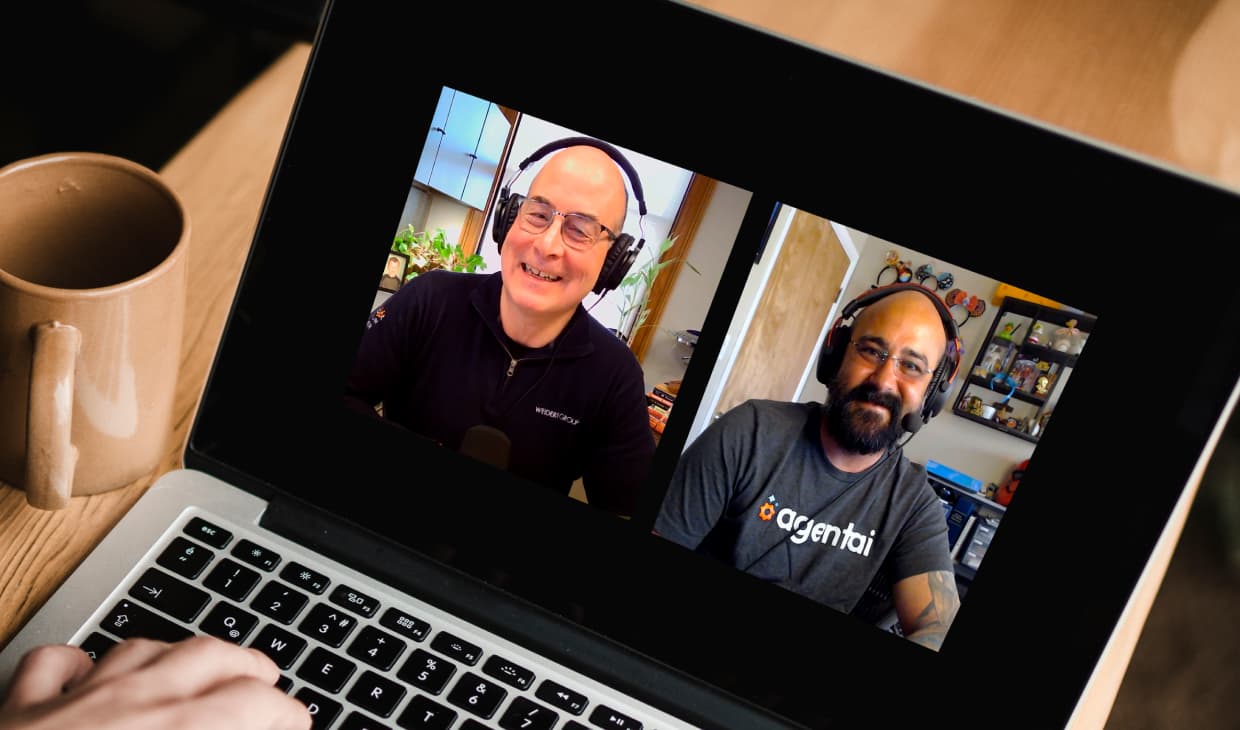AI in Industrial Marketing & Content Creation: Real Talk from Two Years in the Trenches
Written by
Think back for a moment about the weeks and months after ChatGPT’s public launch on November 30, 2022. Within five days, the platform drew more than a million users—and faster than you could say “prompt engineer,” marketers had some thoughts.
Doomsayers predicted the end of human content creation. Writers would be out of a job, followed by designers, developers, data analysts…you get the point. On the other hand, techno-utopian zealots jumped in to feed the hype cycle and sell AI snake oil.
I sat down with Greg Linnemanstons for The ChangeOver Podcast to start unpacking what we’ve learned so far about using generative artificial intelligence in industrial marketing. As Weidert Group’s president, Greg has been watching this transformation from a leadership perspective, while I’ve been in the trenches championing AI implementation in our content creation processes. Our conversation revealed just how far we’ve come from those early days of uncertainty— and where the real opportunities lie for industrial marketers.
Here’s one truth, two years into implementing AI: both camps got it wrong. And that’s actually great news for industrial marketers. Read on for details—or go ahead and check out the podcast:
The Arrival (and Upheaval) of Generative AI
Remember when everyone thought prompt engineering was going to be the hot new career path? That lasted a few months. What's fascinating is how quickly AI has evolved beyond needing specialized prompt crafting — it's learning to teach its users, making it increasingly accessible to everyone on your marketing team. (Did you catch the irony? Many prompt engineer jobs are, it turns out, vulnerable to automation and AI.)
At Weidert Group, we made an intentional decision to democratize AI access, putting tools in every team member’s hands and encouraging daily experimentation. This “learn by doing” approach helped us quickly separate the truly valuable applications from the hype, while building confidence across the team.
“C-suite people shouldn’t send their people off to do it. They should be doing some of it themselves so that they can authentically have a conversation with their people. ‘Hey, did you try this? Yes, I tried this, and this is what I learned.’”
— Greg Linnemanstons, President, Weidert Group
How We’re Putting AI to Work in Industrial Marketing
Cutting through the hype, Greg and I talked about what’s really making a difference in our day-to-day content creation processes. A few highlights:
AI Supercharges SME Interviews and Content Development
This is where things get exciting. We’re doing more SME-driven content than ever, and for good reason — there’s growing demand for real expert perspective. Think about it: you can’t Google the decades of experience living in your engineers’ heads.
AI helps us tap into that expertise more effectively by:
- Getting us up to speed on technical concepts before interviews
- Generating smarter, more informed questions
- Helping us understand complex topics quickly (I’m no engineer, but AI helps me speak their language)
A brief conversation with Claude helps me brush up on physics, technology, or regulatory details so I don’t waste the precious time I manage to spend with an SME. NotebookLM can digest reams of documents and answer questions about their contents. Fireflies takes notes for me, so I can fully immerse myself in the conversation. And as a writer, I’m spoiled for choice when it comes to AI platforms I can use to draft, refine, and repurpose content for different formats and distribution platforms.
Getting Quality Control Right
Accuracy matters more in industrial marketing content than almost anywhere else. You can’t afford hallucinations about technical specifications or made-up case studies. Here’s how we address the risk of AI hallucinations as we use the tools in content creation:
- We never, ever, trust a statistic without fact-checking and verification
- SME content review is absolutely non-negotiable
- Ownership and accountability are human, so I’m personally responsible for the work I create using AI tools
Personalization is About to Get Extremely Personal
Remember when adding someone’s first name to an email felt cutting-edge? Those days are long gone. Modern CRM systems and customer platforms like HubSpot are integrating AI right into the tools, enabling marketers to serve up truly relevant content based on actual, individual behaviors.
That means even small and scrappy marketing teams can now create genuinely personalized experiences, at scale. Your CRM data just got a whole lot more valuable, and it’s waiting to be put to work in ways that actually matter to prospects and customers.
The AI Tools We Use Every Day
I literally never work without a few tabs open to different AI tools. Here’s what's earning its keep on my laptop:
Daily Drivers
- ChatGPT for quick research and content ideation
- Claude for specific writing tasks
- Perplexity when I need to dig deeper on research
- Fireflies for notetaking so I can easily turn conversations into content
- NotebookLM for making quick sense of piles of documents
Specialists
- SparkToro for understanding audiences with depth and precision
- SEMrush for keeping our SEO sharp (its AI copilot greets users with personalized recommendations for improvements)
That’s my current toolkit. Here are a few more that just about any content manager might add to their wishlist:
- AnswerThePublic dombines AI and search data to generate content ideas based on what users are searching for
- Clearscope analyzes search results and provides content writers with keyword suggestions, topics, and readability improvements
- Grammarly checks for grammar, punctuation, and style issues, and provides suggestions to improve readability and clarity
What We’ve Learned So Far
After two years of trial and error, we can confidently offer a few recommendations. If you’ve been hesitant to dive in, explore, and experiment with AI in your process, don’t keep sitting on the sidelines. The sooner you get started, the better.
- Start simple: You don’t need to jump straight into specialized tools. Get comfortable with generalist AI tools first — it’s probably more powerful than you think, and you’ll gain an intuitive grasp on how to interact and collaborate with AI.
- Think enhancement, not replacement: AI isn’t here to take over authorship or to do your critical thinking. It’s here to help you write better content, faster.
- Never skip quality control: In industrial marketing, accuracy isn't just nice to have — it's essential. Build your verification process and apply it to every content piece you create.
- Keep your SMEs close: Use AI to make your SME interactions more productive, not to replace them. Their expertise is your secret weapon for content that can’t easily be replicated.
- Own your output: If it has your name on it, it's yours — AI-assisted or not. Take that responsibility seriously.
What’s Next?
The tools will keep evolving (probably faster than any of us expect), but here’s what won't change: the need for genuine expertise and human judgment in industrial marketing. AI is helping us get better at what we do, but it hasn’t taken over entirely (just yet 😉).
Think of AI as a smart, enthusiastic, eager-to-please colleague who’s there to collaborate, not compete. Used right, it helps you create more valuable content for your audience while maintaining the technical accuracy and human insight that makes your marketing content more helpful to prospects and customers — and much more valuable to your marketing efforts.
Ready to dig deeper into AI implementation in content marketing? Listen to my full conversation with Greg Linnemanstons on The ChangeOver Podcast, and subscribe to be sure you don’t miss what comes next!
Subscribe To Our Blog
Information. Insights. Ideas. Get notified every time a new Weidert Group blog article is published – subscribe now!
You May Also Like...

Artificial Intelligence
Revenue-Driving B2B Content Marketing Strategy with Andy Crestodina

Artificial Intelligence
AI Agents Are Here—How Smart Businesses Are Using Them Now

Inbound Marketing
Podcasting Playbook: What We Learned After 100 Days of Running a B2B Podcast
Accelerate Your Growth with
Weidert Group
If you’re ready to explore a partnership, request a personalized consultation with our team.

